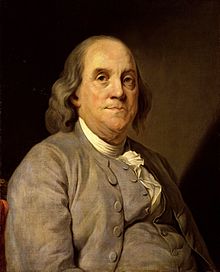America’s first library
March 24th, 2013 at 8:00 am (History, Library School)
 Leave it to Benjamin Franklin to conceive of the idea of a shared lending library. He hypothesized that a group with pooled resources could build a book collection that would go beyond the means of any individual member. In 1731, the Library Company of Philadelphia was incorporated as a subscription library. Wikipedia cites this motivation for the library’s creation:
Leave it to Benjamin Franklin to conceive of the idea of a shared lending library. He hypothesized that a group with pooled resources could build a book collection that would go beyond the means of any individual member. In 1731, the Library Company of Philadelphia was incorporated as a subscription library. Wikipedia cites this motivation for the library’s creation:
“… they had discovered that their far-ranging conversations on intellectual and political themes foundered at times on a point of fact that might be found in a decent library.”
Members paid 40 shillings to join and 10 shillings per year after that. This library still exists today (with about 500,000 books) and still works under a subscription model ($200 to join and $100 per year).
In addition to benefiting its direct subscribers, the Library Company offered free access for delegates to the Continental Congress and Constitutional Conventions in 1774 – 1787. Perhaps they, too, stood to benefit from resolving points of fact that arose during debate. Hooray for fact-based discussion and resolution of arguments! Thank you, libraries one and all!
 Imagine a library that has no books. Instead, the stacks have been replaced with computer terminals, e-readers (for circulation and checkout), and “collaboration areas.” That’s the plan for the new BiblioTech library in San Antonio, Texas. It will be an almost 5000 square-foot library, with precisely zero physical books.
Imagine a library that has no books. Instead, the stacks have been replaced with computer terminals, e-readers (for circulation and checkout), and “collaboration areas.” That’s the plan for the new BiblioTech library in San Antonio, Texas. It will be an almost 5000 square-foot library, with precisely zero physical books.